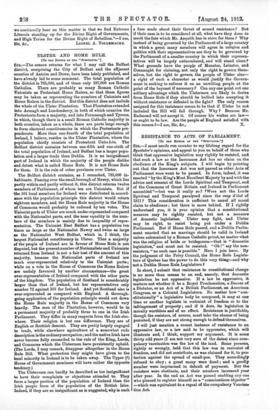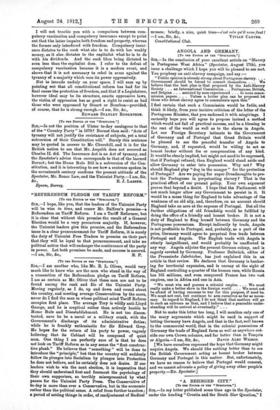RESISTANCE TO ACTS OF PARLIAMENT.
[To THE EDITOR Or THE " SPECTATOR...1 SIB, I must needs run counter to my lifelong regard for the Spectator's opinions, and appeal to you on behalf of those who think that oppressive legislation may rightly be resisted, and that such a law as the Insurance Act has no claim on the obedience of the King's subjects. I will begin by pointing out that the Insurance Act was not passed as other Acts of Parliament were wont to be passed. In form, indeed, it was enacted " by the King's Most Excellent Majesty by and with the advice and consent of the Lords Spiritual and Temporal, and of the Commons of Great Britain and Ireland in Parliament assembled "—but was it really so ? Mere not the Lords Spiritual and Temporal paralysed since the coup d'etat of 1911 ? This consideration is sufficient to annul all moral claim to obedience ; but there is more behind. If I rightly understand you, it is your opinion that a constitutional measure may be rightly resisted, but not a measure of domestic legislation. Ulster may fight, and Ulster may be right, to resist being put under a Dublin Parliament. But if Home Rule passed, and a Dublin Parlia- ment enacted that no marriage should be valid in Ireland unless solemnized by a Roman Catholic priest, no matter what was the religion of bride or bridegroom—that is " domestic legislation," and must not be resisted. " Oh !" say the non- resisters, "no such case is possible." Here I join issue. By the judgment of the Privy Council, the Home Rule Legisla- ture of Quebec has the power to do this very thing—and why not a Dublin Home Rule Legislature ?
In short., I submit that resistance to constitutional change is no more than means to an end, namely, that domestics legislation be not oppressive. If a law be oppressive, it matters not whether it be a Royal Proclamation, a Decree of a Dictator, or an Act of a British Parliament, an American Congress, or a Colonial Legislature. No matter how " con- stitutionally " a legislative body be composed, it may at one time or another legislate in restraint of freedom or to the infringement of property ; and if it does, its legislation is morally worthless and of no effect. Resistance is justifiable, though the resisters, of course, must take the chance of being punished, if they are not strong enough to defend themselves.
I will just mention a recent instance of resistance to an oppressive law, or a law said to be oppressive, which will illustrate and, I think, support my argument. It is some thirty odd years (I am not very sure of the dates) since com- pulsory vaccination was the law of the land. Some persons, rightly or wrongly, held that this law was in restraint of freedom, and did not contribute, as was claimed for it, to pro- tection against the spread of small-pox. They accordingly refused to obey ; a great many were fined ; and a goodly number were imprisoned in default of payment. But the resisters were obstinate, and their numbers increased year after year. In the end an Act was passed enabling any one who pleased to register himself as a " conscientious objector" —which was equivalent to a repeal of the compulsory Vaccina. tion Act.
I will not trouble you with a comparison between com- pulsory vaccination and compulsory insurance except to point out that the latter impairs both freedom and property, whereas the former only interfered with freedom. Compulsory insur- ance dictates to the cook what she is to do with her weekly money, as it also . dictates to the capitalist what he is to do with his dividends. And the cook likes being dictated to even less than the capitalist does. I refer to the defeat of compulsory vaccination because it is a modern event, and shows that it is not necessary to rebel in arms against the tyranny of a majority which uses its power oppressively.
Not to intrude unduly on your space, I will sum up by pointing out that all constitutional reform has had for its final cause the protection of freedom, and that if a Legislature, however ideal may be its structure, enacts oppressive laws, the victim of oppression has as good a right to resist as had those who were oppressed by Stuart or Bourbon—provided, of course, that he is strong enough.—I am. Sir, &c.,
EDWARD STANLEY ROBERTSON.



































 Previous page
Previous page